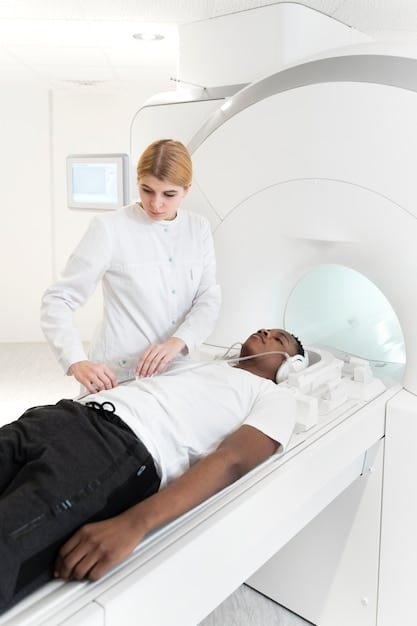The Latest Research on Depression: New Treatments and Therapies in 2025

The latest research on depression in 2025 highlights promising new treatments and therapies, including advancements in medication, psychotherapy, and innovative approaches like neuromodulation techniques, offering renewed hope for individuals seeking effective mental health solutions.
Navigating the complexities of depression can feel like traversing an endless maze. Thankfully, the future of mental health care is shining brighter than ever. Let’s delve into the latest research on depression: new treatments and therapies available in 2025, offering a beacon of hope for those seeking relief.
Understanding Depression: A 2025 Perspective
Depression, a prevalent mental health condition, continues to affect millions worldwide. Understanding its multifaceted nature is crucial for developing effective treatments. In 2025, our understanding of depression has evolved significantly, with advancements in neurobiology, genetics, and environmental factors.
The Evolving Definition of Depression
Depression is no longer viewed as a monolithic condition but rather as a spectrum of disorders with varying causes and symptoms. This nuanced understanding allows for more personalized and targeted treatment approaches.
Key Factors Contributing to Depression
Several factors contribute to the development of depression, including genetic predisposition, biochemical imbalances, environmental stressors, and psychological trauma. Recognizing these factors is essential for comprehensive assessment and treatment planning.
- Genetic factors play a significant role, with research identifying specific genes associated with increased risk.
- Neurotransmitter imbalances, such as serotonin, norepinephrine, and dopamine, are implicated in the pathophysiology of depression.
- Chronic stress, adverse childhood experiences, and social isolation can trigger or exacerbate depressive symptoms.
- Psychological factors, such as negative thinking patterns, low self-esteem, and maladaptive coping mechanisms, contribute to the maintenance of depression.
In summary, our understanding of depression in 2025 reflects a more holistic and integrated approach that considers the interplay of biological, psychological, and social factors.
Advancements in Medication for Depression
Pharmacological interventions remain a cornerstone of depression treatment. In 2025, advancements in medication have led to more effective and targeted therapies with fewer side effects.
Next-Generation Antidepressants
Newer antidepressants are designed to target specific neurotransmitter systems and receptor subtypes, resulting in improved efficacy and tolerability. These medications often have fewer side effects compared to traditional antidepressants.
Personalized Pharmacotherapy
Pharmacogenomics, the study of how genes affect a person’s response to drugs, is increasingly used to tailor medication choices to individual patients. This approach maximizes treatment effectiveness while minimizing adverse reactions.

- Selective serotonin reuptake inhibitors (SSRIs) remain a first-line treatment option for many individuals with depression.
- Serotonin-norepinephrine reuptake inhibitors (SNRIs) are effective for treating depression accompanied by chronic pain or fatigue.
- Atypical antidepressants, such as bupropion and mirtazapine, offer unique mechanisms of action and may be beneficial for individuals who do not respond to other antidepressants.
- Pharmacogenomic testing can help predict an individual’s response to specific antidepressants, guiding treatment decisions and minimizing trial-and-error approaches.
In conclusion, the advancements in medication for depression in 2025 reflect a shift towards personalized and targeted therapies that optimize treatment outcomes while minimizing side effects.
Cutting-Edge Psychotherapy Techniques
Psychotherapy, or talk therapy, plays a vital role in the treatment of depression. In 2025, cutting-edge psychotherapy techniques are enhancing the effectiveness of traditional approaches.
Mindfulness-Based Cognitive Therapy (MBCT)
MBCT combines cognitive behavioral therapy (CBT) with mindfulness practices to help individuals recognize and manage negative thought patterns and emotions. This approach promotes emotional regulation and reduces relapse rates.
Acceptance and Commitment Therapy (ACT)
ACT focuses on accepting difficult thoughts and feelings rather than trying to suppress or control them. By encouraging individuals to commit to values-based actions, ACT promotes psychological flexibility and resilience.
The Role of Virtual Reality (VR) in Therapy
Virtual reality (VR) therapy is emerging as a promising tool for treating depression. VR simulations can create immersive and interactive environments that allow individuals to practice coping skills in a safe and controlled setting.
- CBT helps individuals identify and modify negative thought patterns and behaviors that contribute to depression.
- Interpersonal therapy (IPT) focuses on improving communication and relationship skills to address interpersonal problems that may be contributing to depression.
- Dialectical behavior therapy (DBT) teaches emotion regulation, distress tolerance, and interpersonal effectiveness skills, particularly useful for individuals with co-occurring emotional dysregulation.
- VR therapy can simulate real-life social situations, allowing individuals to practice assertiveness skills and reduce social anxiety associated with depression.
To summarize, cutting-edge psychotherapy techniques in 2025 offer innovative and personalized approaches to address the psychological and emotional challenges associated with depression.
Innovative Neuromodulation Therapies
Neuromodulation therapies are non-invasive or minimally invasive techniques that stimulate or modulate brain activity to alleviate depressive symptoms. In 2025, these therapies are gaining increasing recognition as effective treatment options.
Transcranial Magnetic Stimulation (TMS)
TMS uses magnetic pulses to stimulate specific areas of the brain involved in mood regulation. It is a non-invasive procedure that is typically well-tolerated.
Electroconvulsive Therapy (ECT)
ECT involves the brief administration of electrical stimulation to the brain to induce a controlled seizure. While it may sound intimidating, modern ECT is performed under anesthesia and is considered a safe and effective treatment for severe depression.
Deep Brain Stimulation (DBS)
DBS involves the implantation of electrodes in specific brain regions to deliver electrical stimulation. It is typically reserved for individuals with treatment-resistant depression who have not responded to other therapies.

- TMS is FDA-approved for the treatment of depression and is often used when medication and psychotherapy have not been effective.
- ECT can provide rapid relief from severe depressive symptoms and is particularly useful in cases where immediate intervention is needed.
- DBS has shown promise in treating individuals with treatment-resistant depression by modulating activity in brain circuits involved in mood regulation.
- These therapies offer hope for individuals who have not found relief from traditional treatments.
In conclusion, innovative neuromodulation therapies in 2025 represent a significant advancement in the treatment of depression, offering new avenues for symptom relief and improved quality of life.
The Role of Lifestyle Interventions
Lifestyle interventions, such as diet, exercise, and sleep hygiene, play a crucial role in managing and preventing depression. In 2025, these interventions are increasingly recognized as integral components of comprehensive treatment plans.
The Impact of Diet on Mental Health
A healthy diet rich in fruits, vegetables, whole grains, and lean protein can positively impact mood and cognitive function. Conversely, a diet high in processed foods, sugar, and unhealthy fats can worsen depressive symptoms.
The Benefits of Exercise
Regular physical activity has been shown to reduce symptoms of depression by increasing levels of endorphins, serotonin, and dopamine in the brain. Exercise also improves sleep, reduces stress, and boosts self-esteem.
Prioritizing Sleep Hygiene
Adequate sleep is essential for mental health. Poor sleep can exacerbate depressive symptoms and impair cognitive function. Establishing a consistent sleep schedule, creating a relaxing bedtime routine, and optimizing the sleep environment can improve sleep quality.
- A diet rich in omega-3 fatty acids, found in fish, flaxseeds, and walnuts, has been linked to a reduced risk of depression.
- Engaging in at least 30 minutes of moderate-intensity exercise most days of the week can significantly improve mood and reduce depressive symptoms.
- Creating a dark, quiet, and cool sleep environment and avoiding caffeine and alcohol before bed can promote restful sleep.
- Mindfulness practices, such as meditation and deep breathing exercises, can help reduce stress and improve overall well-being.
In summary, lifestyle interventions in 2025 are recognized as powerful tools for managing and preventing depression, complementing traditional treatments and promoting overall well-being.
Integrating Technology into Mental Health Care
Technology is transforming mental health care by improving access, convenience, and personalization of treatment. In 2025, digital tools and telehealth services are becoming increasingly integrated into mainstream mental health practice.
Teletherapy and Online Counseling
Teletherapy allows individuals to access mental health services remotely through video conferencing, phone calls, or text-based messaging. This approach removes geographical barriers and offers greater flexibility and convenience.
Mental Health Apps and Wearable Devices
Mental health apps and wearable devices can track mood, sleep patterns, activity levels, and other relevant data. This information can be used to personalize treatment and provide timely interventions.
Artificial Intelligence (AI) in Mental Health
AI is being used to develop chatbots that provide emotional support, screen for mental health conditions, and personalize treatment recommendations. AI algorithms can also analyze large datasets to identify patterns and predict treatment outcomes.
- Teletherapy expands access to mental health services for individuals in rural areas or those with mobility limitations.
- Mental health apps can provide self-help resources, track progress, and connect individuals with support networks.
- Wearable devices can monitor physiological indicators of stress and provide real-time feedback to help individuals manage their emotions.
- AI-powered chatbots can offer immediate support and guidance to individuals experiencing emotional distress.
In conclusion, the integration of technology into mental health care in 2025 is revolutionizing the way depression is treated, making care more accessible, convenient, and personalized.
| Key Point | Brief Description |
|---|---|
| 🧠 New Meds | Targeted antidepressants with fewer side effects. |
| 🧘 MBCT & ACT | Mindfulness and acceptance-based therapies to manage thoughts. |
| 🧲 TMS | Non-invasive brain stimulation for mood regulation. |
| 📱 Teletherapy | Remote mental health services via video or messaging. |
Frequently Asked Questions
▼
New medications include targeted antidepressants with fewer side effects and personalized pharmacotherapy based on individual genetic makeup, leading to more effective treatment.
▼
Mindfulness-based therapy combines cognitive behavioral therapy with mindfulness practices to help individuals recognize and manage negative thoughts and emotions, promoting emotional regulation.
▼
TMS uses magnetic pulses to stimulate specific areas of the brain involved in mood regulation. It’s a non-invasive procedure often used when medication and psychotherapy haven’t been effective.
▼
Yes, lifestyle interventions like diet, exercise, and sleep hygiene play a crucial role. A healthy diet, regular exercise, and prioritizing sleep can significantly improve mental health and reduce depressive symptoms.
▼
Technology is transforming mental health care through teletherapy, mental health apps, wearable devices, and AI, improving access, convenience, and personalization of treatment.
Conclusion
The landscape of depression treatment in 2025 is marked by innovation and a deeper understanding of the condition. From advanced medications and cutting-edge therapies to the integration of technology and lifestyle interventions, individuals seeking relief have more options than ever before. By embracing these advancements, we can pave the way for a future where mental health care is more effective, accessible, and personalized.





